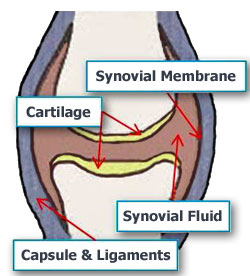Joints are nature’s hinges and are designed to allow you to bend, twist and move in many ways. Unfortunately, when joints are damaged due to injury or illness each movement is painful and limited. Joints, being a connection between two bones, depend not only on surrounding structures to function but also on cartilage, which is a smooth tissue and a lubricant called synovial fluid to prevent them from rubbing together. The best way to care for your joints is to keep them strong and stable. This also applies to the surrounding muscles, tendons and ligaments which support them.
 Cartilage is a rubbery cushion which prevents joints from grinding together and being flexible and strong it can take the pressure of joint movement without any damage. Lining the inside of the joint is the synovial membrane which is a thin layer of cells that produce synovial fluid to keep the joint moist and well lubricated. Discomfort in joints can be caused by many things including sprains, strains, osteoarthritis, rheumatoid arthritis and gout
Cartilage is a rubbery cushion which prevents joints from grinding together and being flexible and strong it can take the pressure of joint movement without any damage. Lining the inside of the joint is the synovial membrane which is a thin layer of cells that produce synovial fluid to keep the joint moist and well lubricated. Discomfort in joints can be caused by many things including sprains, strains, osteoarthritis, rheumatoid arthritis and gout
Recent reports suggest that it is not simply “wear and tear” that causes loss of cartilage in joints but a deficiency in the body’s production of collagen. Cartilage is made up of collagen and one of the most effective ways of getting collagen into your body is by drinking chicken broth made from the bones and especially the feet of the chicken. Broth made from chicken feet will also contain the protein elastin which helps with flexibility. Another animal source of collagen is the heel of the cow, which when cooked, has a glutinous look but when well- prepared as “cow heel soup” can be quite tasty. Bone marrow is also another useful source of collagen. For vegetarians and vegans non- dairy sources of collagen are agar and Irish moss, both seaweeds. A defect in how the bones actually fit together can also cause early wear and tear together with being overweight which puts additional pressure on the joints so losing weight will have a positive effect on your joints. In fact, being overweight puts additional pressure on the hips and knees which can cause the cartilage to wear out faster. Being overweight can also produce inflammatory chemicals known as cytokines that can damage the joints.
Eating mineral rich foods such as sardines and tuna is very beneficial to the health of your joints as these provide calcium and vitamin K (the forgotten vitamin) which are essential for the integrity of your bones and joints. You can rebuild the cartilage in your joints by increasing your consumption of fatty acids, alkalizing foods and magnesium. Some natural foods like cabbage, pineapple, aloe vera, cayenne pepper, ginger, turmeric, beet, sweet potato and coconut oil are also important for joint health
Most people wrongfully assume that if you have issues with your joints, including osteoarthritis and rheumatoid arthritis that resting the affected joint will help relieve the associated pain. In fact, it is more beneficial to exercise the joint than to let it remain idle and stiff. You should also check your vitamin D levels. It has been documented that arthritis progresses quicker with those people who are low in vitamin D. Vitamin D, as you know, is synthesized by ultra-violet rays from direct sunshine onto the skin but in the absence of sunshine a vitamin supplement is the next best option. Make sure, however, that it is a vitamin D3 supplement as all other types are synthetic and as a consequence are not readily absorbed by the body. You should also bear in mind that a spray or drops are better absorbed than tablets.
The word arthritis literally means “inflammation within the joints” but when it affects the ligaments and tendons it is known as enthesitis. The conventional approach to arthritis is that it is incurable and treatments therefore have more to do with easing the symptoms by way of rest, exercise, heat (to increase blood circulation to the painful area), joint replacement and rehabilitation and very little attention is paid to addressing the underlying cause which is inflammation. The two most common types of arthritis are osteoarthritis and rheumatoid arthritis.
Symptoms of osteoarthritis are pain with joint movement, joint stiffness and swelling, joints that feel unstable, reduced mobility of the joint and a grinding sensation during joint movement Pain killers like aspirin and ibuprofen only address pain temporarily and do not offer a long term solution since they only treat the symptoms and not the root cause of the disease. In fact these can also have serious side effects if used over the long term, mainly issues with the digestive tract, ulceration and bleeding in the stomach so although they are often prescribed you should look at other treatments as a way of addressing the problem.
Rheumatoid arthritis is regarded as an auto-immune disease where the body’s immune system is attacking the body instead of defending it. Modern thinking suggests that all autoimmune diseases, including rheumatoid arthritis, can be treated by improving your gut bacteria to reduce inflammation. The suggestion then is that any diet that reduces inflammation is good for rheumatoid arthritis.
Research at the New York School of Medicine 2013 pointed the finger very squarely at an unfriendly bacteria called Prevotella copri (P.copri) as a cause of rheumatoid arthritis. One reason for this is that 75% of people examined who were newly diagnosed with rheumatoid arthritis had this bacteria. Researchers have also identified numerous viruses, bacteria and fungi with all types of arthritis. Antibiotics have very little effect on joints as joints do not have a blood supply like organs. Joints are encased in a very tough protective membrane so blood cannot flow through but bacteria can. Without blood white blood cells and antibiotics are less effective. Medium chain fatty acids from coconut oil are said to be able to penetrate into the joints and destroy viruses and bacteria that are associated with rheumatoid arthritis.
Gout is a type of arthritis where uric acid crystalizes in and around joints. It is usually associated with the big toe but can also affect other areas such as the knees, ankles, elbows, fingers and wrists, in addition to ligaments and tendons. Although gout has been known to affect many parts of the body simultaneously it normally affects one joint. A gout attack can last between five and fifteen days and can come on quite suddenly with severe pain, swelling and tenderness around the affected area.
Conventional treatments for gout can involve non -steroidal anti-inflammatory drugs (NSAIDs) such as ibuprofen and paracaetamol or steroids. Uric acid is made in the body from a breakdown of purines that come from your diet so it is advisable to reduce your consumption of foods that are high in purines such as beef, lamb, pork, chicken, dried peas, beans and legumes and baked beans. You should also eliminate sugar, processed foods, alcohol and sugary drinks. Eating complex carbohydrates, healthy fats, and generally eating to lose weight can go a long way to reducing the incidence of gout. Natural foods should include ginger, turmeric, bicarbonate of soda, apple cider vinegar and cherries and using Epsom salts in your bath will also help.
Uric acid is also associated with , high blood pressure, high cholesterol, heart disease and kidney disease.
Anti- inflammatory foods that you should put in your joint account are ginger, turmeric, bromelain, devils claw, boswelia and coconut oil. Coconut oil acts as an anti-inflammatory, a pain reliever, muscle and joint lubricant and relaxant, it promotes circulation in the tendons and ligaments, improves joint flexibility by reducing stiffness and can be taken internally, as food or topically, as an ointment. This will help your joint account and put your health in the black.
